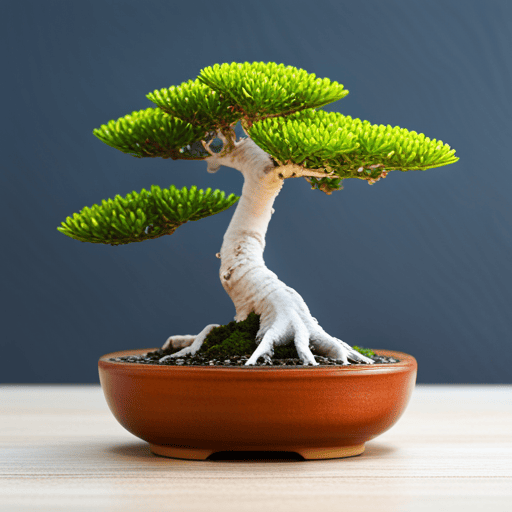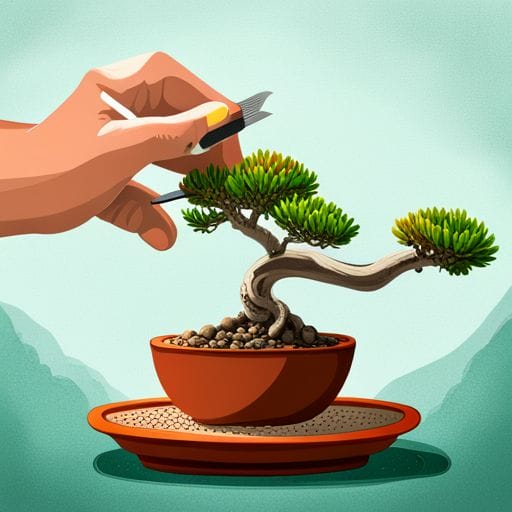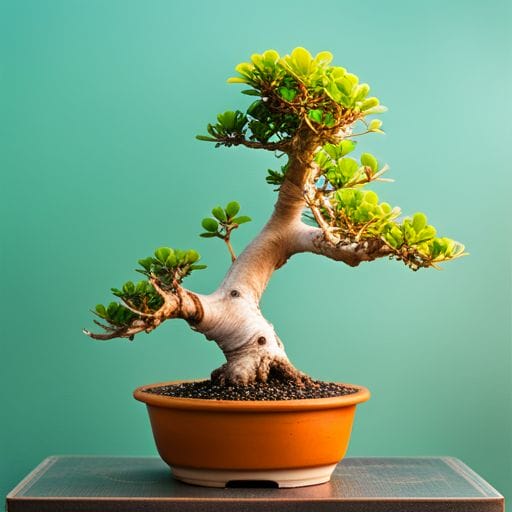Portulacaria Afra, commonly known as Dwarf Jade, Spekboom, or Elephant Bush, is an evergreen succulent that originates from South Africa. This small and beautiful plant is often cultivated as a houseplant or bonsai, and it is renowned for its ability to remove carbon from the air.
In this article, we will explore the proper care and maintenance required to ensure the health and vitality of Portulacaria Afra bonsai.
Cultivating Portulacaria Afra bonsai requires well-draining soil and careful watering to prevent root rot. These bonsai thrive in full sunlight and should be protected from temperatures below 5°C and frost. Regular feeding with a general all-purpose fertilizer during the growing season is recommended to promote healthy growth. Pruning is well tolerated by Portulacaria Afra bonsai and can encourage branching. Repotting should be done in summer, allowing ample time for the roots to heal before watering.
Furthermore, we will also address common issues and pests that may affect these bonsai trees, with a particular focus on mealy bugs.
Lastly, we will discuss the propagation of Portulacaria Afra bonsai through cuttings and how beginners can benefit from their ease of care and response to pruning.
Contents
- 1 Quick Points
- 2 What is it?
- 3 Growing and Maintenance
- 4 Common Issues and Pests
- 5 Frequently Asked Questions
- 5.1 Can Portulacaria Afra bonsai be grown outdoors in a colder climate?
- 5.2 How often should Portulacaria Afra bonsai be fertilized?
- 5.3 Can Portulacaria Afra bonsai be shaped using wiring techniques?
- 5.4 What is the best method for propagating Portulacaria Afra bonsai?
- 5.5 How often should Portulacaria Afra bonsai be pruned to encourage quick development?
Quick Points
- Portulacaria Afra, also known as Dwarf Jade or Elephant Bush, is a small evergreen succulent native to South Africa.
- Portulacaria Afra bonsai require loose, fast-draining soil and should be watered sparingly to avoid root rot.
- These bonsai trees need lots of sunlight and should be protected from temperatures below 5°C (41°F) or frost.
– Regular pruning and feeding with a general all-purpose fertilizer during the growing season are necessary for the healthy growth of Portulacaria Afra bonsai.
What is it?

Portulacaria Afra, also known as Dwarf Jade, Spekboom, or Elephant Bush, is a small evergreen succulent native to South Africa and is commonly grown as a houseplant or bonsai due to its ability to remove carbon from the air.
This plant is found in drier regions and is characterized by its fleshy, round leaves and red stems. Portulacaria Afra bonsai require loose, fast-draining soil to prevent root rot caused by overwatering. They thrive in full sun and should not be exposed to temperatures below 5°C (41°F) or frost.
Regular pruning is well tolerated by Portulacaria Afra bonsai, promoting ramification and a compact growth habit. Mealy bugs are a common pest for these bonsai trees. Propagation can be easily done from cuttings, making Portulacaria Afra bonsai a suitable choice for beginners in bonsai cultivation.
Growing and Maintenance

To ensure optimal growth and health, proper cultivation and upkeep practices should be followed for the Portulacaria Afra bonsai. These evergreen succulents require specific care to thrive. When it comes to growing Portulacaria Afra bonsai, it is essential to use a loose and fast-draining soil mix. Overwatering should be avoided, as it can lead to root rot. Allowing the soil to dry out between watering sessions is recommended.
Additionally, these bonsai trees need plenty of sunlight and should be placed in a location that receives full sun. They are not frost-tolerant and should be protected from temperatures below 5°C (41°F). Fertilizing with a general all-purpose fertilizer once a month during the growing season is necessary. Regular pruning is well-tolerated and promotes ramification. Mealy bugs can be a common pest, so regular monitoring is advised.
Propagation can be easily done from cuttings, and Portulacaria Afra bonsai respond well to pruning and can be grown both indoors and outdoors.
Common Issues and Pests

Common issues and pests that can affect the health of Portulacaria Afra bonsai include root rot caused by overwatering, mealy bugs as common pests, and the need for regular monitoring to prevent infestations.
Overwatering can lead to root rot, which is a common problem for these bonsai trees. To prevent this, it is important to let the soil dry out between watering.
Mealy bugs are another common pest that can affect the Portulacaria Afra bonsai. These small, white, cotton-like insects feed on the plant sap and can cause damage if not addressed promptly. Regular monitoring and inspection of the bonsai can help to identify and prevent infestations. Taking appropriate measures such as using insecticidal soap or wiping the leaves with a cloth can help control mealy bug populations.
Frequently Asked Questions
Can Portulacaria Afra bonsai be grown outdoors in a colder climate?
Portulacaria Afra bonsai should not be grown outdoors in colder climates as they are not hardy and cannot tolerate temperatures below 5°C (41°F) or frost. They are best suited for indoor cultivation.
How often should Portulacaria Afra bonsai be fertilized?
Portulacaria Afra bonsai should be fertilized once a month during the growing season with a general all-purpose fertilizer. This regular feeding will provide the necessary nutrients for the bonsai to thrive and develop properly.
Can Portulacaria Afra bonsai be shaped using wiring techniques?
Yes, Portulacaria Afra bonsai can be shaped using wiring techniques. However, it is important to be careful as the branches of this bonsai are easily snapped. It is recommended to use clip and grow techniques instead.
What is the best method for propagating Portulacaria Afra bonsai?
The most effective method for propagating Portulacaria Afra bonsai is through stem cuttings. This can be done using either the dry or wet method. Stem cuttings should be taken during the growing season and placed in well-draining soil until roots develop.
How often should Portulacaria Afra bonsai be pruned to encourage quick development?
Portulacaria Afra bonsai should be pruned regularly to encourage quick development. The frequency of pruning will depend on the desired growth rate, but it is generally recommended to prune every 2-4 weeks during the growing season.




